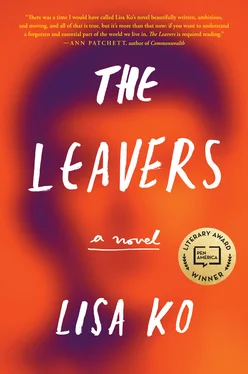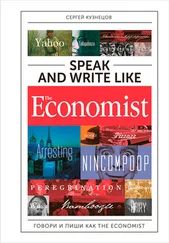After two months, I kissed Yong. Six months later, we had our wedding at a hotel in Wuyi Square. Twelve courses were served, eight of them seafood.
THERE WASN’T ANYTHING I could do,” I said. “I couldn’t go back to America after being deported. I couldn’t go anywhere. If I thought about you too much I wouldn’t be able to live.”
I knew how it must sound to you: I hadn’t tried hard enough, I didn’t love you enough. But I could have kept looking forever. I needed you to understand.
“You forgot me,” you said.
“No. Never.”
“You didn’t even tell your husband about me.”
“I did tell him. You met him. You know.”
“You didn’t tell him until I called you.”
My head sagged. You were right.
“I thought he’d be angry, and then he would leave me.” But that, too, was a lie. I’d only told myself that. I had never believed it.
“I thought you went away because I did something wrong. I was a kid!” You pounded the mattress with your fists. You must have wanted to punch me, too.
“You didn’t do anything wrong,” I said. “When I returned to China and learned Leon had paid off the rest of my debt, I knew you were okay. Even if I hated the idea of you calling a white lady ‘Mama’ or ‘Mom’.”
You snorted. “Leon didn’t pay off the loan shark. Vivian did.”
Now I felt like I had really been punched. “But you were safe, weren’t you? With your adoptive parents?” I could hear the pleading desperation in my own questions, how badly I wanted to believe you’d been fine, that I had done all I could.
There was a long silence. Finally you said, “I never call my adoptive mother ‘Mama’ or ‘Mom’.”
You shut off the light. For a moment we lay together, on our separate beds, as your words pulled a warm blanket over us and made us less alone.
19
He hadn’t expected to like teaching so much. Today he split his students out into groups of three for role-playing: ordering at a restaurant, asking for directions in English. The other instructors, even his mother, laughed at him for making work harder for himself and not teaching the workbook. But his students were awake, engaged, and he was willing to be held up for their amusement and curiosity. When he said they could ask him anything they wanted, as long as they asked in English, they shouted out questions. What kind of clothes did people wear in New York? What did they eat? Did he have a girlfriend? Boss Cheng had reprimanded him, said his class was too noisy, but when Daniel’s students told their friends about him and these new students enrolled and requested to be in his class, Boss Cheng stopped bugging him. “Boss Cheng doesn’t know his head from his ass,” his mother said, cackling her old laugh. He leaned toward her compliments, always craving more. “You’re the best teacher at that school. You should be director.” That was her new plan for him. He’d stay in Fuzhou, follow her footsteps. It made him feel proud, yet also unsure. He didn’t know if he wanted to be the director of World Top English. But then she would look at him and smile and he would smile back, thinking, Yes, this is where I belong .
He had been living in China for three months, hadn’t spoken to Peter and Kay since leaving Ridgeborough in August. People no longer laughed at his accent; his Mandarin and Fuzhounese had slipped back into native-speaker levels, and the gaps between translating and speaking had grown smaller and smaller until they were nearly imperceptible, his brain automatically shifting into Chinese.
His tourist visa was expiring soon, and his mother was in the process of sponsoring him for a real work visa. The forms had been in his room for weeks, and he needed to fill them out. Until then, he couldn’t legally receive a salary, wasn’t on the official payroll at World Top English, but Boss Cheng paid his mother extra money, which she then deposited into his bank account.
After his morning class, Daniel went out for lunch with two of the other teachers, Eddie and Tammy. They usually insisted on McDonald’s or Pizza Hut, places where he would never voluntarily eat. Today they were going to a spaghetti restaurant that Tammy said was sophisticated, though Daniel would have been fine going to a noodle stall and slurping down a cheap bowl of soup. They walked the three blocks from World Top to the restaurant, Daniel familiar with most of the streets in downtown Fuzhou, accustomed to mopeds coming at him at in all directions. The summer in Ridgeborough, the liminal New York winter that had preceded it, seemed like another lifetime ago. It was astounding to think that that had been him, tromping across the ice on Canal Street, not knowing that by the end of the year, he would have not only have seen his mother again but be living with her, seeing her every day.
Inside the restaurant, an old song was looping on the speaker, the moon hitting the singer’s eye like a big pizza pie. The waitresses wore red, white, and green uniforms. It was a Macaroni Grill on steroids. Eddie climbed into the banquette next to him. “Is the menu authentic?” Outside of class, they spoke Fuzhounese.
Daniel flipped through the pictures of pastas drowning in red and white sauces. If it wasn’t a Chinese restaurant, Tammy and Eddie always made him order. “Yes,” he said.
Tammy brushed her bangs away from her eyes. Unlike Eddie, she avoided eye contact at all costs. “Restaurants where the waitresses wear uniforms are always authentic. Deming, you order for all of us.”
Daniel asked the waitress for three bowls of spaghetti and meatballs and a platter of garlic sticks. Eddie’s unblinking gaze felt like being cross-examined. Tammy said she’d heard that the restaurant served the best American food in Fuzhou.
“This food isn’t American,” Eddie said.
“Well, it’s Italian,” Daniel said. “But the dishes are more of an American style. They would call it Italian American.”
Tammy said, “But is it Italian or American?”
“It’s both.”
“But Italians aren’t American,” Eddie said.
“Sure, they can be Italian American. Like if your parents were born in Italy, but you were born in America.”
“Then you’d be American,” Tammy said. “Because you were born in America.”
“Well, you can be Chinese American. I’m Chinese American because I was born in America.”
“But you have a Chinese face so that makes you Chinese,” Tammy said.
“Americans can have Chinese faces. They aren’t only white people.”
Tammy and Eddie glanced at each other and Eddie muttered a quick sentence in Fuzhounese that Daniel couldn’t catch.
“I’m right here, you know,” Daniel said. “I can hear you talking about me.”
“We’re not talking about you,” Tammy said.
The tomato sauce was too sweet, the pasta overcooked, and Daniel ached for a proper New York thin slice, folded in half and chowed down while standing at an oily pizzeria counter. Tonight, he’d pick up food on the way home and eat in front of the TV. If he was in Manhattan or Ridgeborough his friends would be buying him shots, but instead he would return to an empty apartment. His mother was supposed to be coming home late, on the bullet train from Xiamen, where she had spent the last two days for work. She no longer watched him so carefully, like he was in danger of vanishing, and on weekends they spent hours walking around the city together, having long, easy meals, and he would feel warm and full. But when she made plans for him, mentioned people she wanted him to meet or a trip they might take in the future, he would feel a sticky dread, like he had overslept on a winter day and woken up to discover it was already dark.
He didn’t want to be alone, not today. “What are you two doing tonight?”
Читать дальше











